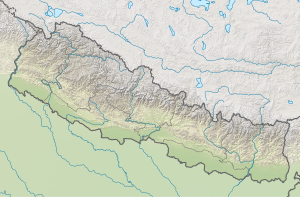Runtigadhi is a Rural municipality located within the Rolpa District of the Lumbini Province of Nepal. The rural municipality spans 232.69 square kilometres (89.84 sq mi) of area, with a total population of 27,929 according to a 2011 Nepal census.[1][2]
Runtigadhi (RM)
रुन्टीगढी गाउँपालिका | |
|---|---|
| Coordinates: 28°13′N 82°27′E / 28.21°N 82.45°E | |
| Country | |
| Province | Lumbini |
| District | Rolpa |
| Wards | 9 |
| Established | 10 March 2017 |
| Government | |
| • Type | Rural Council |
| • Chairperson | Janak Pun (NC) |
| • Vice-chairperson | Sarita KC (NC) |
| Area | |
• Total | 232.69 km2 (89.84 sq mi) |
| Population (2011) | |
• Total | 27,929 |
| • Density | 120/km2 (310/sq mi) |
| Time zone | UTC+5:45 (Nepal Standard Time) |
| Headquarter | Jhenam |
| Website | runtigadhimun |
On March 10, 2017, the Government of Nepal restructured the local level bodies into 753 new local level structures.[3][4] The previous Jhenam, Sakhi, Jauli Pokhari, Masina, Dubring, portion of Jedwang and Dubidanda VDCs were merged to form Runtigadhi Rural Municipality. Runtigadhi is divided into 9 wards, with Jhenam declared the administrative center of the rural municipality.
Demographics
editAt the time of the 2011 Nepal census, Runtigadhi Rural Municipality had a population of 28,517. Of these, 98.6% spoke Nepali, 1.3% Magar and 0.1% Hindi as their first language.
In terms of ethnicity/caste, 43.0% were Magar, 29.7% Chhetri, 13.4% Kami, 4.4% Damai/Dholi, 3.9% Sanyasi/Dasnami, 3.1% Sarki, 1.3% Thakuri, 0.3% Hill Brahmin, 0.2% other Dalit and 0.7% others.
In terms of religion, 94.8% were Hindu, 4.1% Christian, 0.4% Buddhist and 0.7% others.[5]
References
edit- ^ "District Corrected Last for RAJAPATRA" (PDF). www.mofald.gov.np. Retrieved 17 July 2018.
- ^ "स्थानीय तहहरुको विवरण" [Details of the local level bodies]. www.mofald.gov.np/en (in Nepali). Ministry of Federal Affairs and Local Development. Retrieved 17 July 2018.
- ^ "New local level structure comes into effect from today". www.thehimalayantimes.com. The Himalayan Times. 10 March 2017. Retrieved 17 July 2018.
- ^ "New local level units come into existence". www.kathmandupost.ekantipur.com. 11 March 2017. Retrieved 18 July 2018.
- ^ NepalMap Demographics [1]
External links
edit

